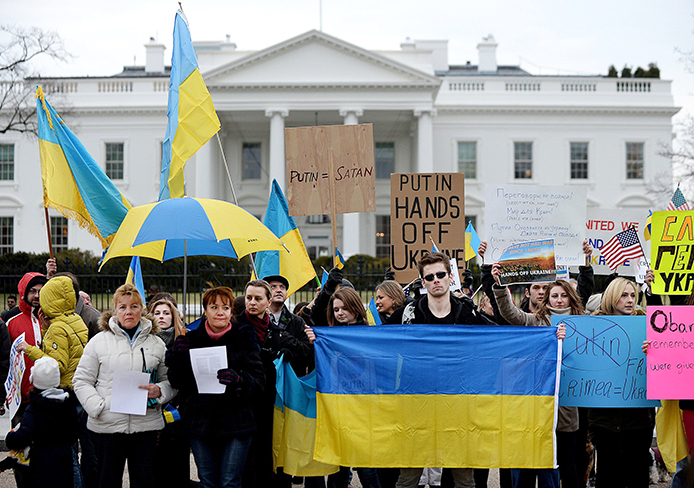
Protesters gather outside the White House to call on the US and European Union to do more to combat Russian aggression in Ukraine’s Crimean peninsula March 1 in Washington, D.C. Credit: Courtesy of MCT
Pundits who claim that Russian President Vladimir Putin still operates within a Cold War mentality got their biggest piece of evidence Saturday when Russian armed forces moved into the Crimean peninsula of Ukraine. Refusing to let go of the former Soviet country, Putin stormed his parliament, demanding approval for military intervention across the Ukraine. After quickly obtaining it, Putin started with grabbing the strategic and largely pro-Russian Crimean peninsula as a method of solidifying Russian control over the volatile country. There were hopes that tensions would relax following Ukrainian President Viktor Yanukovych’s departure to Russia, and the apparent success of pro-European Union protestors. However, that is apparently not the case, as Yanukovych’s removal does not signify the end of Russian control over Ukraine. In fact, Putin and Yanukovych himself apparently still wholeheartedly believe in Yanukovych’s legitimacy as president.
Previous to these events, anti-government protestors had been celebrating what any realists would call their victory, while the pro-Russian parts of the Ukraine were left dejected following their government’s dissolution. But over the last week, Russia’s hand in Ukrainian affairs has expanded sporadically. Russian forces occupied Crimea apparently without firing a single shot, as it seems like Putin was trying to physically demonstrate his domination over Ukraine rather than engage in real warfare.
Within the Ukraine, there seems to be no unified reaction to Putin’s abrupt taking of Crimea. Whether it’s liberation or invasion depends entirely on whom you ask; citizens in and around Kiev, Ukraine’s capital, along with Ukraine’s acting president, Oleksandr Turchynov, appear pro-EU and protests against the Russian invasion are already underway. However, eastern Ukraine sings a different tune, welcoming the presence of Russia as the first piece of good news in months. As a result of the eastern Ukraine’s deep cultural and historic ties with Russia, many people there were horrified by Yanukovych’s departure and the new pro-EU path the country was poised for.
Outside the Ukraine, international concern has been much more unanimous in the condemnation of Russia. There has not been much vocal support for Russia coming from eastern Europe or former Soviet countries, while disapproval from the West has been sharp and continuous. President Barack Obama has called the use of force in the Ukraine a breach of international law, while Canadian Prime Minister Stephen Harper announced his recalling of the Canadian ambassador to Russia. Politicians throughout the European Union have nearly unanimously echoed the words of Obama and Harper, while former Ukrainian Prime Minister Yulia Tymoshenko is already urging for EU and UN conventions in Kiev and Crimea.
According to statements by Russian members of parliament, there are no current decisions on whether or not the Russian invasion will spread beyond Crimea. Further developments and predictions are very unclear at this point, as it’s not apparent what Putin’s intentions for the Ukraine are. There have been many words and “warnings” (Obama’s specialty) from the West, but Putin does not seem to be taking them very seriously — after receiving the same warnings for the past few months, why would he? It would be no surprise if Russia continued expanding into the Ukraine without actually engaging in warfare, as a broken government with a scarred military doesn’t stand much of a chance against a man who lives in his own fantastical world. What is clear to many is that this could be a start of a drawn out tug-of-war between the European Union and Russia over the Ukraine, and it looks as though Putin might have gotten the first tug.


